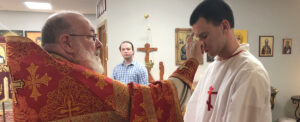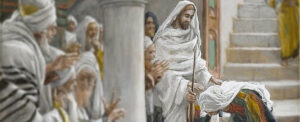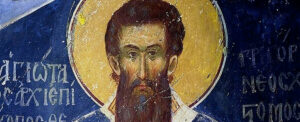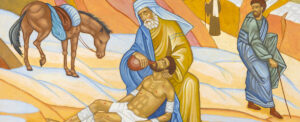This morning we hear about a man whose ground brought forth plentifully and who was deliberating what he should do with this increase.
He decides that he is going to pull down his barns because his increased harvest can’t fit in there. So he needs to build bigger barns to store his harvest.
And he’s going to say to his soul, “Soul, you have done well!”
Now, when scripture says the word soul you can usually understand that as self. It’s not any complicated theological jargon. When King David says, “Bless the Lord, O my soul” (Psalm 103:1) he says to himself, “Self! Praise the Lord!” He finds himself depressed, and asks, “Why art thou cast down, O my soul? And why groan within me?” (Psalm 41:5lxx). Self, why are you sad and despondent? “Hope in God, for I shall yet praise him for the help of his presence.”
Our rich man today says to himself, “Self, you have done well!”
You’re not crazy if you talk to yourself! But you’d better be speaking truth to your self. If you keep saying to yourself, “You’re lazy and stupid and nobody loves you and you deserve every bad thing that happens,” then you’re not only hurting yourself – you’re giving the devil a day off. He is the one who’s described as the Accuser of the Brethren (Revelation 12:10). And he’s your enemy. “Be sober, be vigilant; because your enemy the devil walks about like a roaring lion, seeking whom he may devour” (1 Peter 5:8). Sometimes the enemy of our souls hands us a loaded gun and we point it at ourselves; we destroy ourselves by practicing accusation instead of thanksgiving.
You know, this morning’s parable and this past week’s feast of Thanksgiving stand as two ways to respond to blessing.
“See, I have set before thee this day life and good, and death and evil” (Deuteronomy 30:15), Moses said to the sons of Israel. “I call heaven and earth as witnesses today against you, that I have set before you life and death, blessing and cursing; therefore choose life, that both you and your descendants may live; that you may love the Lord your God, that obey His voice, and that you may cling to Him, for He is your life and the length of your days” (Deuteronomy 30:19-20).
Our rich man sees that he has sufficient to meet his needs, and more, and he says to himself, “Self, you have done well! Eat, drink, and be merry. Take your ease. Don’t worry about a thing.” But God calls him out.
This is one of those few instances in a parable when God intervenes, where God is not represented by another character: a landowner, a king, a judge… In this parable, God is God. And He says, “You fool!” Ouch! God just called you a fool. “Your life is going to be required of you this very night! Then who is going to get everything you have prepared for yourself?” And the Lord says, “This is how it will be with whoever stores up things for themselves but is not rich toward God” (Luke 12:16-21).
“Rich towards God.” A few minutes ago we sang, “Blessed are the poor in spirit, for theirs is the kingdom of heaven” (Matthew 5:3). In fact that word means the penniless, the empty-handed, ones who have nothing. And in King Solomon adds, “Riches are worthless in the day of wrath, but righteousness brings deliverance from death” (Proverbs 11:4).
So: having enough to eat and a roof and running water, and a car in the driveway – which is how at least half the world describes wealth and riches – is that a blessing or a curse in eternity? That depends on you.
I’ve had people advise me where I should invest my income. Stocks, mutual funds, so many options. Saint Lawrence, the Archdeacon of Rome, taught me where to invest.
He was responsible for administering all the finances of the underground Church in the city of Rome, caring for all the widows, the poor and the sick. In 258 AD, the prefect of Rome sent word to Saint Lawrence, demanding he turn over the riches of the. So Lawrence asked for three days to gather the wealth. He worked quickly to distribute all the Church’s property to the poorest people in Rome. On the third day, at the head of a small delegation, he presented himself to the prefect. When ordered to deliver the treasures of the Church, he presented the city’s beggars, crippled, blind, and suffering, and declared, “Here are the treasures of the church. You see, the church is truly rich, far richer than your emperor!”
Lawrence was arrested, tortured, and gave up his soul as a victorious martyr. He was poor in spirit – that is, he had nothing to offer the Lord and trusted in his mercy. And he was “rich toward God” in that he had invested every penny he’d received in the one safe investment: mercy to the poor.
Saint Paul instructs Timothy, bishop of Ephesus, saying:
Instruct those who are rich in the present age not to be conceited and not to put their hope in the uncertainty of wealth, but in the living God, who richly provides all things for us to enjoy. Instruct them to do good, to be rich in good works, ready to give, willing to share, storing up for themselves a good foundation for the time to come, that they may lay hold on the life of eternity. (1 Timothy 6:17-19).
Our culture tends to put billionaires and rockstars on a pedestal as if they were people to emulate, but all these icons around us, all our feasts and fasts are here to teach us to look for women and men of virtue, integrity, piety, faith and good works, and to build our lives on the foundation they show us. That’s wealth.
You might still end up with a big bank account; a lot of us here in America are pretty sure where our next rent check is coming from, and we can buy braces for the kids, a new phone, a second car.
I hope this Thursday on Thanksgiving Day you took time to meditate on all the good the Lord has done to you in your life, and to practice gratitude, to give thanks to the Lord for his mercy endures forever. Every time you pay for groceries, or when you write a rent check, do you give thanks to the Lord who has put those funds in your hands?
We’re like the man in today’s parable – we have enough, and often more than enough. Maybe not this year, but many of us have been poor, and we’ve been comfortable, and we may be one or the other again.
Why does God make some people rich? It’s not so that they can live big, build new barns, take their ease and not worry about anything or anybody. No, the reason the Lord makes anyone rich anyone is so that they can show mercy. This is the whole reason he makes people wealthy. You’ve heard me say it before: If your hands are closed to the poor, they’re closed when you turn to God. The same tight fists we show the beggar are the fists we raise to God – and that’s no way to pray.
So, what do we do, we who call ourselves disciples of Jesus Christ? We need to show mercy with the money that passes through our open hands. This is the reason that anything is given to you.
You know, there’s a discipline I try to practice: When I pray, I don’t call anything mine. When I set out in the morning, I start the car, and I pray, “Lord, bless your car. May it get me there and back again.” Your car, Lord. I’m just the guy who puts in gas and drives it. On the first of the month, I look at the bills, and say, “Lord, please show me how to pay your bills, for your honor and glory,” and when the bills are paid and I’ve sent my little tithe to the church website, if there’s something left over I ask, “Lord, show me what you want done with your money.” When I pray to the Lord who made heaven and earth, how can I call anything “mine”?
The Lord tells so many parables about stewards – that’s a King James kind of word for a manager or bookkeeper. You know what happens when the bookkeeper for a business skims off money for himself? That’s embezzlement and he goes to jail. What about you and me, when the Lord has blessed us abundantly, filled our wallet with his money, so we can buy food, pay the rent, even do something fun with the children – but then we turn a hard heart to someone who asks for help from the Lord’s money. It’s not our money.
You know, a dollar bill is nothing. It’s a piece of paper. Our money is a symbol. It is symbolic of the substance of your life, what you need to make your life possible: to buy food for yourself, for your family, to have shelter for you and your family, to have clothing, to have transportation, to have clean water pumped into your house. Money is a symbol of the necessities of life, and we are called to give God a sacrifice from out of this.
We see Abraham who gives a tenth of all that he has to Melchizedek, the priest-king of Salem for the worship of God Most High (Genesis 14:18-20). In the Torah, the tithe is commanded (Leviticus 27:30-32). The tithe being a tenth of what you receive, the first fruits of what you receive, the tenth off the top, not the tenth that is left. We bring this to God in the temple. For what purpose? Well, for the maintenance of the temple, for the services. If we have a place to pray, if the lights are on, if there’s heat, it’s because you are bringing your firstfruits into the temple.
If you are not yet in the practice of giving a tithe to the church, start today. Start today. I know that there are a few people who live comfortably but do not tithe. Start today. What are you afraid of? I know some people who are struggling, and do not tithe. Begin.
Is ten percent a commandment in the Gospel? Is it ten percent of gross or after tax? Here’s Saint Paul:
But this I say: He who sows sparingly will also reap sparingly, and he who sows bountifully will also reap bountifully. So let each one give as he purposes in his heart, not grudgingly or of necessity; for God loves a cheerful giver (2 Corinthians 9:4-7).
Jesus looked up, he saw the rich putting their gifts into the temple treasury. He also saw a poor widow put in two very small copper coins. “Truly I tell you,” he said, “this poor widow has put in more than all the others. All these people gave their gifts out of their wealth; but she out of her poverty put in all her living” (Luke 21:1-4).
This is between you and God. You will decide how much and how often you will invest in the work of the Church in this place. Our tithe is a pledge of our trust in the Lord God. Our trust that He is the Provider. He is the Sustainer. He gives us what we need. If we give to Him first, whatever is left over will be enough for us. We will not do without.
And I should emphasize that I have a job. The parish has been helping me with a housing allowance, and I’m grateful; but now that I am working, all we receive in tithes and offerings is going to the maintenance of this temple and to good works as the Lord enables.
Also, I am not a signer on the parish’s bank account so I don’t know who tithes or how much. I don’t know if you’re tithing more than I am. I don’t want to know. I’m talking about this today because our tithes and almsgiving are a foundational part of our personal worship of Christ, and part of how we build a parish community.
The tithe, whatever amount you have determined in your heart to bring into the temple every week or month, is where we start. Besides the tithe, Christians share our goods with the poor, with those who do not have, those who are struggling. You have brothers and sisters in Christ who are struggling. If a brother has a car accident, has broken bones and can’t go to work, what’s to be done for him? He needs the mercy of the Church. If brothers and sisters have been laid off from jobs, they need help paying their bills. In and outside this parish community, we have people suffering all manner of difficulties, and sometimes it turns out the Lord has provided what they need by giving it to us.
We have begun the Nativity Fast. We have begun stripping away things that are not necessary. We have begun to see what we can do without ,so that we can focus on God, so that we can focus on prayer and good works.And so, as we are taking away certain things, as we are simplifying our lives, the money that we save from that simplification: chances are, your brothers and sisters in Christ have need of it.
Be mindful of them. Be generous with them. And be generous to the poor stranger, the guy begging on the corner. Yes, he may be lying about his circumstances, but he needs to eat. He is made in the image of God, and how we treat him is how we treat Christ. So don’t pass him by. If you have something in your pocket, give it to him.
When the Christian writer C.S. Lewis was walking down the sidewalk, and a beggar was on the corner, he gave him some money. And Lewis’s friend chastised him for it. He said, “You know he’s just going to go spend that on drink!” Lewis said, “Funny, I was thinking about doing the same thing with it myself.” It’s not easy being homeless, and the guy freezing out there with a sign is working hard. Give him a break – and God bless you for it.
Let’s be generous with our treasure, not be tight-fisted. Let’s not worry about our lives. I can guarantee this: at the end of our lives, none of us will say, “You know, I wish I had given less. I just wish I had been more rigid, less open-handed.” No one’s going to say that. In the Judgment, you’re going to wish you had given it all away. If you don’t think you can do that, then make a habit of giving some of it away, and God bless you as you do.
Our Lord has an open hand towards us. If we want to share his life, we have to have an open hand to those around us. And to our God whose hand is always open to us and who asks us to imitate him. be all glory, honor, and worship: to the Father, and to the Son, and to the Holy Spirit, now and ever and unto the ages of ages.






